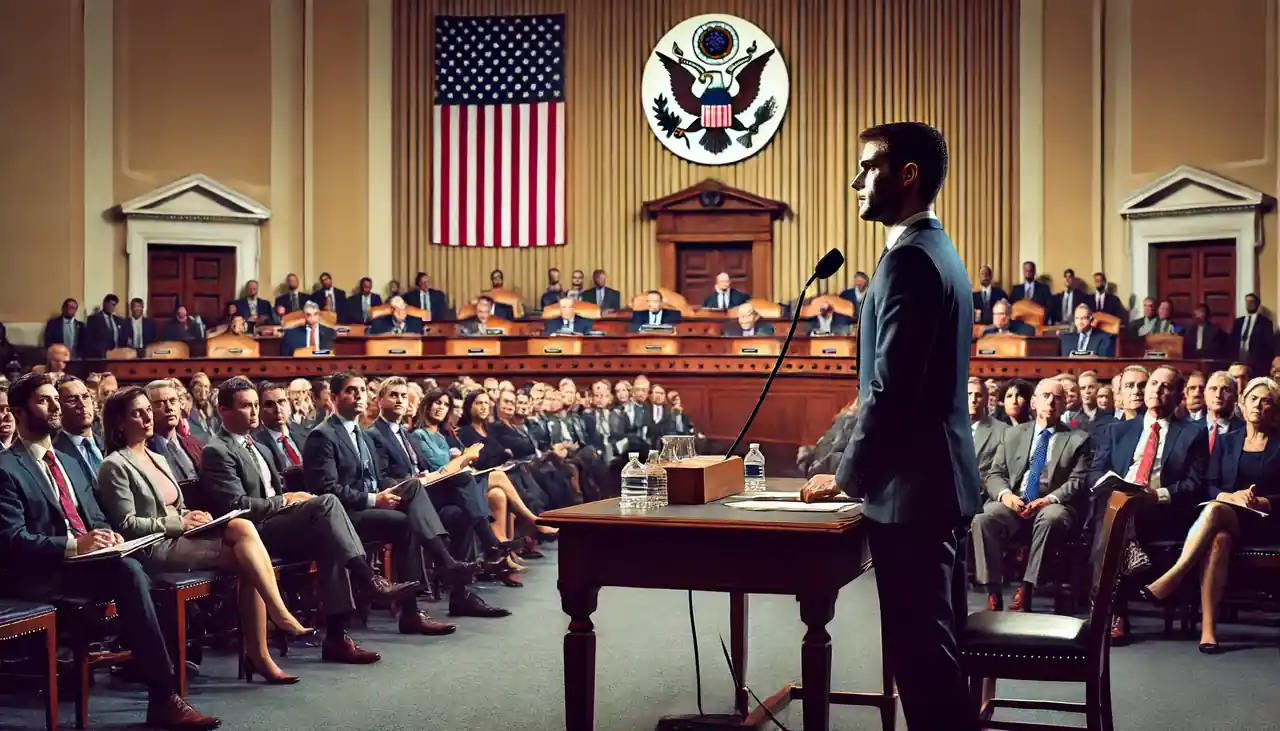In 2022, an FBI employee was questioned about his stance on COVID-19 vaccination, support for former President Trump, and attendance at a pro-Second Amendment rally. This led to a complaint to the DOJ’s internal watchdog, alleging political bias. The employee’s security clearance was revoked after confirming his views on these topics. Journalist Kim Iversen labeled this as “The New McCarthyism,” indicating a trend of punishing individuals for their opinions. The employee’s lawyer argued that the FBI’s actions violated constitutional rights and Supreme Court precedent. This case ties into broader concerns about the FBI’s involvement with Big Tech to monitor and censor dissenting views.

A Shocking Litmus Test
Security Clearance Interrogation
In the spring of 2022, several months after the U.S. Supreme Court struck down the Biden administration’s vaccine mandate for private employers and another federal court issued an injunction on the government’s vaccine mandate for federal employees, the FBI conducted a security clearance review for a longtime employee. During this process, officials asked the employee if he opposed COVID-19 vaccination, supported Donald Trump, or had ever attended a pro-Second Amendment rally. Following the interrogation, the employee’s security clearance was revoked. According to Just the News, the interviews confirmed the employee’s support for Trump, his pro-gun rights stance, and his concerns about the COVID vaccine.
Allegations of Political Bias
Journalist Kim Iversen, on her show “The Kim Iversen Show,” described the incident as indicative of a new era of American McCarthyism. She argued that people are being punished for their views and opinions, stating, “If you were skeptical of Big Pharma vaccines and if you actually are pro-Second Amendment, a right that’s enshrined in our Constitution, then you potentially are un-American and you potentially need to be red-flagged … or you might just have the propensity to become a terrorist.”
Legal and Constitutional Implications
Whistleblower Disclosure
The employee’s lawyer, Tristan Leavitt, submitted a letter to the DOJ inspector general with whistleblower disclosures, alleging that the security clearance process was initiated after the employee self-reported taking a vacation day on January 6, 2021, to attend the pro-Trump rally outside the U.S. Capitol. The letter argued that the FBI violated the U.S. Constitution and Supreme Court precedent concerning the First Amendment and employment law. It cited the Supreme Court’s stance that terminating public employees for political patronage purposes is inimical to democratic traditions embodied in the First Amendment.

Broader Context of Political Surveillance
Just the News reported that FBI officials declined to comment on the story. However, two sources revealed that similar information gathering on employees’ political views occurred during other FBI security clearance reviews, suggesting that the practice was not isolated. This revelation follows the release of the “Twitter Files” in late 2022 and early 2023, which showed that the FBI had colluded with Big Tech platforms like Twitter and Facebook to monitor and censor individuals who questioned the Biden administration’s COVID-19 policies or the 2020 U.S. presidential election results.
The Twitter Files
- The Twitter Files refer to a series of internal Twitter documents, emails, and communications that were released by new Twitter owner Elon Musk starting in December 2022.
- Musk granted access to these files to several independent journalists like Matt Taibbi, Bari Weiss, and Michael Shellenberger to shed light on Twitter’s past content moderation practices.
- The files were released in multiple installments, each focusing on a different aspect of Twitter’s decision-making around high-profile content moderation issues.
Key Findings
- Hunter Biden Laptop Story: The first installment revealed Twitter’s internal debates and decision to limit the spread of a 2020 New York Post article about Hunter Biden’s laptop, initially citing concerns about hacked materials before reversing course.
- Account Visibility Filtering: Later releases showed that Twitter used tools to limit the visibility or amplification of certain accounts, including prominent conservative voices, a practice some called “shadow banning.”
- Trump’s Account Suspension: Several installments focused on Twitter’s decision to permanently suspend former President Trump’s account after the January 6th Capitol riots, including internal debates over whether his tweets violated policies.
- Government Interactions: Some files indicated interactions between Twitter and government agencies like the FBI, with the agencies flagging certain accounts or content for review, raising concerns about free speech infringement.
- Employee Influence: The releases highlighted how Twitter employees, perceived as having a liberal bias, may have influenced content moderation decisions, with some arguing for Trump’s suspension after January 6th.
Reactions
- Musk and some conservatives claimed the files showed anti-conservative bias and censorship by Twitter’s previous leadership.
- Critics argued the files largely showed the inherent challenges of content moderation at scale, with difficult judgment calls but no smoking gun of government coercion or intentional election interference.
- There were debates around defining practices like “shadow banning” and whether Twitter was transparent enough about visibility filtering.
In summary, while the Twitter Files provided insights into Twitter’s opaque moderation processes, there were divergent interpretations of whether they revealed an anti-conservative agenda or simply the complexities of running a global social media platform.
The Role of Big Tech and Government Surveillance
The Twitter Files
Documents from the “Twitter Files” revealed that the FBI flagged specific users for Twitter to take action against and pressured platforms to remove purported “COVID misinformation.” These actions included information that was later confirmed to be true. The FBI also partnered with Stanford University’s “Virality Project” to develop an internal system for scrutinizing tweets for their content.

The Secret Virality Project
Stanford University’s “Virality Project” was an initiative aimed at monitoring and analyzing COVID-19 anti-vaccine narratives across social media platforms. The project was a collaborative effort involving multiple research organizations and the FBI, and was active for seven months following the availability of COVID-19 vaccines. Its primary focus was to understand the dynamics of vaccine-related misinformation and disinformation, including the safety, distribution, and effectiveness of vaccines.
Key findings from the Virality Project:
- Anti-vaccine narratives during the COVID-19 pandemic were adaptations of long-standing themes.
- These narratives were largely driven by recurring actors and were highly variable in online engagement, often spreading virally beyond their initial communities.
- Conspiracy theories, while fewer in number, tended to be more engaging than other types of misinformation.
The project also provided recommendations for public health organizations, social media platforms, and government agencies to better address and mitigate the spread of vaccine misinformation. These recommendations emphasized focusing on broader narrative themes rather than individual incidents, improving policy enforcement on social media, and fostering collaboration between various stakeholders to address vaccine hesitancy, especially in underserved communities[17][18][19].
Public Outcry and Concerns
Referring to the Just the News revelations, Kim Iversen expressed grave concerns about the implications of these practices. She noted, “We’ve talked to several FBI whistleblowers who’ve said, look, they’re going after Catholics. They’re going after parents at parent-teacher … conferences where the parents were angry, saying, ‘Hey, we don’t want our kids to be masked up all the time and we want you to open the schools back up.’ And they’re labeling all these people as terrorists.”
Insights
- Allegations of political bias in the FBI’s security clearance process.
- Claims of constitutional violations regarding freedom of speech and political affiliation.
- Broader concerns about FBI’s collaboration with Big Tech to control dissent.
The Essence (80/20)The Origins and Evolution of the 80/20 Principle The Discovery by Vilfredo Pareto In 1897, Italian economist Vilfredo Pareto uncovered a striking pattern in his study of wealth and... More
Core Topics:
- FBI Security Clearance Bias: The employee was questioned on political and personal views, leading to clearance revocation and allegations of bias.
- Constitutional Rights Violation: Actions were argued to infringe on First Amendment rights, especially concerning political beliefs and associations.
- Broader Surveillance Concerns: FBI’s collaboration with Big Tech to censor dissenting voices, particularly regarding COVID-19 and political opinions.
The Action Plan – What a New President and Party In the White House Should Do
- Internal Review: Conduct a thorough internal review of the FBI’s security clearance process to ensure it aligns with constitutional rights.
- Policy Reform: Implement clear guidelines that prevent political bias in employment and security evaluations.
- Transparency: Increase transparency in interactions between federal agencies and social media platforms to maintain public trust.
- Whistleblower Protections: Strengthen protections for employees who report potential misconduct or bias.
Blind Spot
Potential overlooked detail is the long-term impact of these practices on public trust in federal institutions and the broader implications for civil liberties.
Reforming Intelligence and Securing America Act (RISAA)
The new surveillance bill, known as the Reforming Intelligence and Securing America Act (RISAA), significantly impacts the privacy rights of Americans in several ways:
Expansion of Surveillance Authority
Broader Scope of Entities:
- RISAA expands the range of entities that can be compelled to assist with surveillance under Section 702 of the Foreign Intelligence Surveillance Act (FISA). This now includes not just telecommunications companies and internet service providers, but potentially any service provider with access to equipment used to transmit or store electronic communications. This could encompass a wide array of businesses, including data centers, cloud storage providers, and even employees of these entities[1][9].
Increased Government Power:
- The bill grants the government the authority to compel a larger group of people and providers to assist with surveillance, which critics argue could lead to an Orwellian level of government oversight and intrusion into private communications[1][9].
Privacy Concerns and Civil Liberties
Warrantless Searches:
- Despite efforts to introduce amendments requiring warrants for searches involving Americans’ communications, these amendments were rejected. This means that the FBI and other agencies can continue to conduct warrantless searches of data that incidentally includes Americans’ communications[2][4][5]. In 2021 alone, the FBI conducted up to 3.4 million warrantless searches of Section 702 data using Americans’ identifiers[1].
Backdoor Searches:
- The practice of “backdoor searches,” where the government searches through data collected under Section 702 for information about Americans without a warrant, remains a significant concern. This practice has been criticized for violating constitutional rights and has been linked to numerous instances of abuse[5][6].
Civil Liberties Advocacy:
- Civil liberties groups, such as the Electronic Frontier Foundation (EFF) and the Electronic Privacy Information Center (EPIC), have strongly opposed RISAA, arguing that it entrenches and expands the government’s warrantless surveillance authority despite a history of abuses. They emphasize the need for meaningful reforms to protect Americans’ privacy and civil rights[1][2][7].
Legislative and Political Context
Bipartisan Opposition:
- The reauthorization process faced significant opposition from both progressive and conservative lawmakers who were concerned about privacy and civil liberties. Despite this, the bill was passed with a two-year extension, reflecting a compromise that allowed for some minor concessions but largely maintained the status quo[3][4][6].
Future Reforms:
- There is a commitment from some lawmakers to revisit and potentially amend the provisions of RISAA in future legislation, such as the Intelligence Authorization Act. This indicates ongoing efforts to address the privacy concerns associated with Section 702[8].
In summary, the new surveillance bill expands the government’s surveillance capabilities and the range of entities subject to surveillance, while failing to implement significant privacy protections. This has raised substantial concerns among privacy advocates and civil liberties groups about the potential for increased government intrusion into Americans’ private communications.
Looking Ahead
The memos obtained by Just the News and the subsequent revelations have sparked a significant debate about political bias and surveillance within the FBI. The allegations suggest that the bureau’s security clearance process may be influenced by employees’ political views and personal beliefs, raising questions about constitutional rights and democratic principles. As the DOJ’s internal watchdog investigates these claims, the broader implications for government surveillance and individual freedoms remain a critical concern for many Americans.
Frequently Asked Questions
1. What did FBI officials ask a longtime employee regarding COVID-19 vaccination?
FBI officials asked the employee if he opposed COVID-19 vaccination, supported former President Donald Trump, or had attended a pro-Second Amendment rally.
2. What was the outcome for the FBI employee after the security clearance interview?
The employee’s security clearance was revoked after confirming his support for Trump, gun rights, and his concerns about the COVID vaccine.
3. What did journalist Kim Iversen say about the incident?
Kim Iversen described it as a sign of “The New McCarthyism” and expressed concern that people are punished for their views and opinions.
4. What allegations did the employee’s lawyer make?
The lawyer, Tristan Leavitt, alleged that the security clearance process was politically biased and violated the U.S. Constitution and Supreme Court precedent.
5. Did the FBI comment on the allegations?
No, FBI officials declined to comment, but sources indicated that similar information was gathered on other employees’ political views.
6. What did the “Twitter Files” reveal about the FBI?
The “Twitter Files” showed that the FBI colluded with Big Tech platforms to track and censor individuals who questioned COVID-19 policies or the 2020 election results.
7. What is the Reforming Intelligence and Securing America Act (RISAA)?
RISAA is a surveillance bill that expands the government’s surveillance authority and impacts Americans’ privacy rights.
8. How does RISAA expand surveillance authority?
RISAA broadens the scope of entities required to assist with surveillance and increases the government’s power to compel assistance.
9. What are the privacy concerns associated with RISAA?
Privacy concerns include warrantless searches, backdoor searches of data, and potential abuse of surveillance powers.
10. How have civil liberties groups responded to RISAA?
Groups like the Electronic Frontier Foundation have opposed RISAA, citing concerns over privacy and civil rights violations.
11. What has been the political response to RISAA?
There has been bipartisan opposition to RISAA, with lawmakers concerned about privacy and civil liberties. The bill was passed with a two-year extension.
12. Are there any future reforms planned for RISAA?
Lawmakers have committed to revisiting and potentially amending RISAA provisions in future legislation to address privacy concerns.
Citations:
[1] https://www.eff.org/deeplinks/2024/04/us-senate-and-biden-administration-shamefully-renew-and-expand-fisa-section-702-0
[2] https://epic.org/epic-statement-on-final-passage-of-reforming-intelligence-and-securing-america-act-risaa/
[3] https://www.reuters.com/world/us/us-house-passes-controversial-surveillance-bill-fourth-attempt-2024-04-12/
[4] https://apnews.com/article/fisa-donald-trump-surveillance-congress-johnson-81e991c9f82e77b2fe13f8a3e0e25349
[5] https://www.washingtonpost.com/national-security/2024/04/20/congress-extends-controversial-warrantless-surveillance-law-two-years/
[6] https://www.cnn.com/2024/04/19/politics/fisa-senate-negotiations/index.html
[7] https://epic.org/epic-statement-on-house-passage-of-risaa/
[8] https://cdt.org/insights/with-the-passage-of-risaa-fisa-702-reform-has-been-delayed-but-not-denied/
[9] https://reason.com/2024/04/19/how-the-fisa-reauthorization-bill-could-force-maintenance-workers-and-custodians-to-become-government-spies/
[10] https://www.newsnationnow.com/danabramslive/twitter-files-heres-what-theyve-revealed/
[11] https://www.npr.org/2022/12/14/1142666067/elon-musk-is-using-the-twitter-files-to-discredit-foes-and-push-conspiracy-theor
[12] https://www.cbsnews.com/news/twitter-files-matt-taibbi-bari-weiss-michael-shellenberger-elon-musk/
[13] https://americansforprosperity.org/blog/heres-what-you-need-to-know-about-the-twitter-files/
[14] https://en.wikipedia.org/wiki/Twitter_Files
[15] https://www.newyorker.com/news/the-political-scene/what-the-twitter-files-reveal-about-free-speech-and-social-media
[16] https://nymag.com/intelligencer/2022/12/twitter-files-explained-elon-musk-taibbi-weiss-hunter-biden-laptop.html
[17] https://www.viralityproject.org
[18] https://cyber.fsi.stanford.edu/content/virality-project
[19] https://events.stanford.edu/event/narratives_actors_and_policies_that_shape_covid-19_vaccine_conversations_findings_from_the_virality_project
💥 GET OUR LATEST CONTENT IN YOUR RSS FEED READER
We are entirely supported by readers like you. Thank you.🧡
This content is provided for informational purposes only and does not constitute financial, investment, tax or legal advice or a recommendation to buy any security or other financial asset. The content is general in nature and does not reflect any individual’s unique personal circumstances. The above content might not be suitable for your particular circumstances. Before making any financial decisions, you should strongly consider seeking advice from your own financial or investment advisor.










